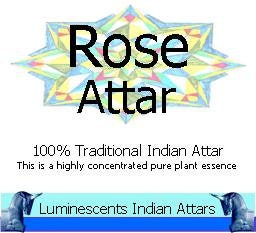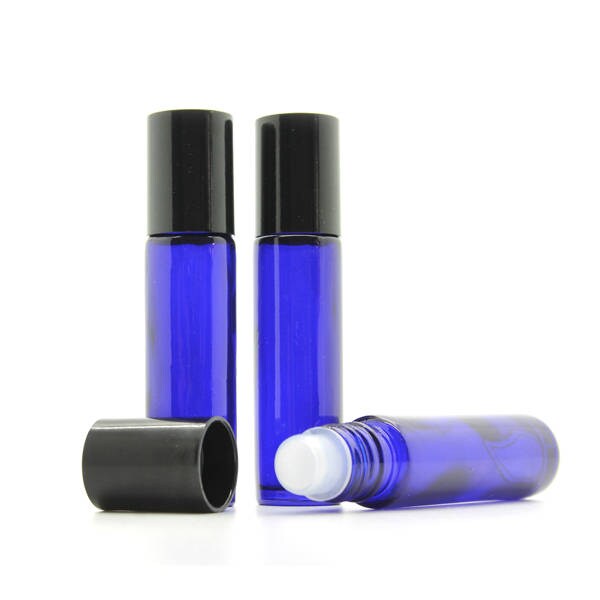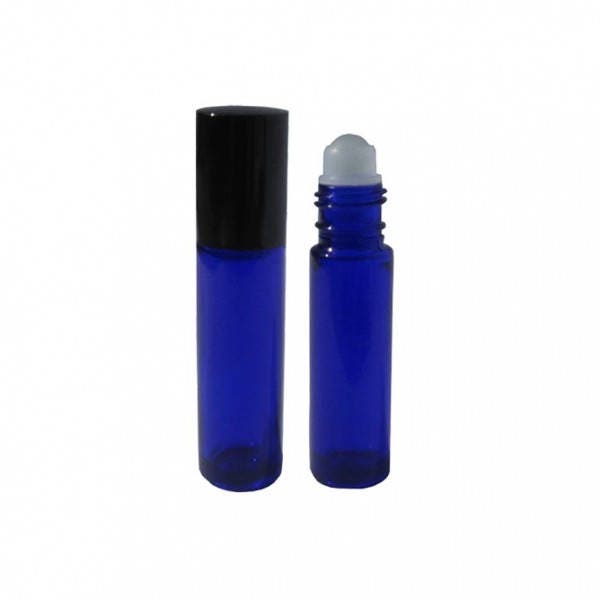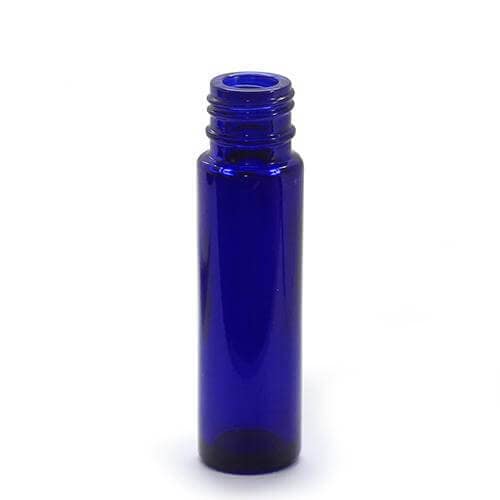



Rose Attar, perhaps the best known of all attars, has a honeyed, heady depth to it blended as it is with Sandalwood (Santalum album) and a little Ambar for added sweetness.
Attars, and Rose Attar in particular, by their very nature are expensive – why? The ingredients used are some of the most expensive in the world.
Attars are some of the oldest known perfume combinations in the world going back to ancient Egypt where they were originally made using what we would now call “enfleurage” which involves the steeping of botanical material in vast quantities in a neutral base oil and then ageing the result for up to ten years which improves and matures the aromatic quality. With the advent of Abi Ali al Sina and his remarkable heat water distillation process, however, which he invented and introduced a thousand years ago they have become very much more affordable since although they are still aged in the same fashion. They were most popular during the Mughal period.
They are usually distillations of highly prized floral and botanical oils in Sandalwood, Agarwood and other rich, rare and epensive wood oils.
They are strong, alcohol free so much favoured in those societies where alcohol is not regarded well, and they are long lasting and penetrating – a small amount goes a very long way. It depends on your skin chemistry but a drop might last all day on you.
This Rose Attar lasted all day and much of the night on me – Its strong, complex and long lasting.
They are usually sold at high prices for quite small amounts in Ittardans ( elaborate shaped perfume bottles ) which are quite impractical in the modern world so we sell ours which we buy direct from the manufacturing perfume company in India each time we travel there in modern cobalt blue rollerball stick bottles which makes it easy to control how much you use, are easy to carry around without leakage and ensures no wastage.
History of the Rose:-
Approximately 4000 kilograms of petals are required to produce 1 kilogram of pure rose oil. It’s exotic nature and value were appreciated in ancient times by the Greeks, Chinese, Indians, Persians and Romans. All documentation indicates that their medical applications of the essential oil were identical to those that exist today.
Throughout the history of civilization, people from around the world have held the rose close to their hearts. We know now that roses have existed much longer than any of us imagined. Even before human time roses flourished: 35 million-year-old fossilized rose flowers and hips have been found in Europe and petrified rose wreaths have been unearthed from ancient Egyptian tombs.
We find the beginning of the roses’ history in legend. The Garden of Eden was full of thornless roses. When Eve fell from grace, it is said that from then on the rose grew thorns on its stems. For over 3,000 years the rose has been called the queen of flowers.
In Greek mythology, Aphrodite, Goddess of Love, is said to have created the rose which arose from her tears and the blood of her lover Adonis. The Romans, turning Aphrodite into their goddess Venus, also adopted the rose: it became the symbol of love and beauty. Cupid, offering a rose when trying to bribe the God of Silence to hush Venus’s amorous escapades, made the flower into a symbol for secrecy: Roman dining room ceilings were decorated with roses, reminding guests to keep secret what had been said during dinner. Sub Rosa, under the rose, up to this day means “confidentially.”
The early Christians saw the five wounds of Christ in the five petals of the Rosa sancta. However, in view of the decadence connected with the Roman rose, the official Christian Church was reluctant to consider the rose a religious symbol. Only after much hesitation was the red rose declared a symbol of the blood of the martyrs. But not only in Christian literature, also in ancient Confucian and Buddhist religious documents we find references to the rose.
The first known paintings of a rose are actually frescoes. The earliest example was discovered in Crete from around 1600 B.C. Scientists believe it was Greek colonist who brought the first rose to Italy. The Romans cultivated this great beauty and named it Rosa Gallica. Newly married couples were often crowned with roses. Roman high society women used petals much like currency believing that they could banish wrinkles if used in poultices. Rose petals were often dropped in wine because it was thought that the essence of rose would stave off drunkenness and victorious armies would return to be showered with rose petals from the civilians that crowded the balconies above the streets.
The oldest garden rose is the Rosa Gallica Officinalis, the apothecary rose. Old garden rose classes include the Albas, Centifolias and Damasks with their heady old rose fragrance from which Absolute oils are now obtained. These have long been grown for their beauty and ability to grow in a most carefree manner. That they bloom only in mid-summer, as do their wild relatives, predating the later repeat flowering roses, is of little consequence in comparison with their easy care beauty and fragrance. Already in 35 AD the Roman writer Virgil wrote about the cultivation of roses and he extolled the virtues of “twice -bearing” roses, probably referring to the Autumn Damasks. But it would still be many centuries before the arrival in the West of the first true repeat-flowering roses form China from which the modern hybrid tea roses would be developed! During the Middle Ages the returning Crusaders brought with them roses from the Middle East.
During these so-called Dark Ages ornamental gardening was not a priority with ordinary people: the newly imported roses were kept alive in monastery gardens. The renewed interest in the garden rose came with 19th century Empress Josephine, wife of Napoleon Bonaparte. This ambitious woman’s dream was to establish a rose garden in Malmaison containing a collection of all the roses of the world. Although France was at war with every country in Europe and isolated by blockades, arrangements were made by England and France to bring to Josephine’s garden newly discovered roses from China.
Payments
We accept direct payments through Etsy by credit/debit card or Paypal transfers to make it as easy as possible for you.
You have the right to cancel an order within 24 hours of placing the order or by request at any time prior to despatch.
Shipping from United Kingdom
We aim to despatch within 2 working days of receipt of order but will inform you if this differs for some reason for any product you may have ordered. We use a tracking service which requires your parcel to be signed for and you will be able, in many instances, to track the progress of your package from door to door.
Orders to destinations outside the EU will have a customs and excise declaration - customers from outside the UK should make themselves aware of any local restriction on imported plant material and the Natural Herbalist can accept no liability for custom and excise intervention in your order at transit or delivery stage.
PLEASE READ – IMPORTANT
ALL ORDER WILL ONLY BE DESPATCHED USING TRACKED AND SIGNED FOR DELIVERY WHERE APPROPRIATE (some countries provide tracked OR signed for only rather than both)
WE GO TO GREAT LENGTHS TO PROVIDE TRACKING ON YOUR PURCHASE SIMPLY SO THAT YOU CAN, AT ANY POINT ON YOUR PARCEL’S JOURNEY, AND WHERE APPROPRIATE AND APPLICABLE, CHECK ON YOUR PARCEL’S PROGRESS.
TRACKING NOT ONLY INFORMS YOU OF WHERE YOUR PARCEL IS BUT ALSO IF THERE ARE ANY PROBLEMS WITH DELIVERY THAT ONLY YOU CAN CORRECT SUCH AS MISADDRESSED PARCELS, NOT BEING IN WHEN YOU HAVE TO SIGN FOR THE PARCEL OR RE-ARRANGING A DELIVERY TO SUIT YOUR SCHEDULE.
AVOIDING USE OF TRACKING WILL ONLY LEAD IN SOME CIRCUMSTANCES TO YOU LOSING YOUR ORDER WHERE YOUR ASSISTANCE IS REQUIRED BY THE CARRIER TO COMPLETE DELIVERY.
PLEASE USE THE TRACKING SERVICE – IT IS SIMPLE AND EASY TO USE AND WILL HELP YOU AVOID DISAPPOINTMENT
We hope you enjoy your purchase
YOU WILL BE REQUIRED BY YOUR DOMESTIC POSTAL SERVICE TO SIGN FOR YOUR PARCEL UPON ITS DELIVERY – IF YOU ARE NOT AVAILABLE TO SIGN FOR YOUR PARCEL YOUR DOMESTIC CARRIER WILL LEAVE A NOTICE FOR YOU TO CONTACT THEM REGARDING YOUR ARRANGEMENT FOR A MORE SUITABLE TIME FOR DELIVERY OR YOUR COLLECTION OF THE ITEM FROM THE SORTING OFFICE – THEY WILL NORMALLY ALLOW UP TO THREE WEEKS FOR YOU TO ACCOMPLISH THIS.
IF, FOR SOME REASON, YOU DO NOT RE-SCHEDULE A SUITABLE TIME FOR YOUR LOCAL CARRIER TO RE-DELIVER YOUR PARCEL, IT MAY BE RETURNED ULTIMATELY TO US. THIS IS BY NO MEANS CERTAIN AND ALWAYS TAKES LONGER THAN THE OUTWARD JOURNEY BUT ONLY UPON RECEIPT OF THE RETURNED PARCEL WILL A REFUND ON THE PURCHASE PRICE BE MADE. WE WILL NOT SEND THE ITEMS AGAIN NOR REFUND THE ORIGINAL CARRIAGE CHARGE.
Our Shipping Terms and Conditions are shown in detail here...
http://www.luminescents.net/information/shipping/
Our General Terms and Conditions are shown in detail here...
http://www.luminescents.net/information/terms-conditions/
No MSDS or COA certification is provided with your order as per our terms and conditions.
Returns & Exchanges
I gladly accept cancellations
Reviews (1)
Average:
Dec 3, 2021
Smells wonderful and looking forward to buying more!
